Honorary Citations
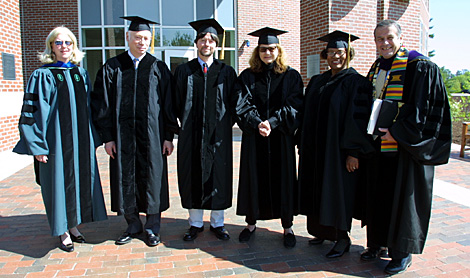
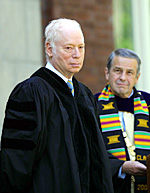 |
|
| Commencement speaker Steven Weinberg received the honorary Doctor of Science degree |
Steven Weinberg
Seeker of the most fundamental knowledge we can know and the most elemental ways of understanding the universe, Steven Weinberg is one of our greatest living physicists. An enormous intellect, he has been an innovator in every field of physics he has explored, from cosmology to high-energy physics, from quantum field theory to the theory of general relativity. He amazes his fellow scientists with his capacity for discovery, insight, and unification. He impresses the world with his wisdom.
Steven Weinberg developed his love of physics as a teenager. He went on to break new ground in the very structure of physics, determining that the long-acknowledged four forces of nature were indeed only three, that electromagnetism and the weak nuclear force were one and the same. Such an elemental and elegant discovery forever changed our understanding of nature, and for this work Dr. Weinberg won the Nobel Prize in 1979. Like Einstein before him, Steven Weinberg continues to seek strategies to unify all the forces of nature into one comprehensive, rational explanation.
Dr. Weinberg is a prodigious thinker and a relentless investigator. He is the author of over 200 professional articles, as well as several textbooks that are standard fare in all graduate physics courses. His three-volume set on quantum field theory and his book on gravitation and general relativity are definitive sources in their fields. Yet Dr. Weinberg also is a science writer for the general reader, having written The First Three Minutes, numerous articles for Scientific American, and most recently, Facing Up: Science and Its Cultural Adversaries. He is as comfortable offering an astute critique of our nation’s defense systems as he is in the esoteric world of particle physics.
For the depth and breadth of his science, for his contributions to our knowledge of the physical world, and for the sheer force of his mind, I present Steven Weinberg for the degree Doctor of Science.
Transcript of Steven Weinberg’s address
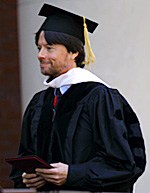 |
|
| Documentary filmmaker Ken Burns received the honorary Doctor of Humane Letters degree |
Ken Burns
Central to our human enterprise is finding meaning through historical understanding. We need to select, to sort, and to cull the elements of our past in order to make the present relevant and the future hopeful.
Ken Burns is a historian, a writer, and a craftsman. Harnessing the knowledge and skills borne of a unique liberals arts education at Hampshire College—including photography, design, history, philosophy, writing, music, literature—Ken Burns has forged a new way of looking at and understanding our collective stories. Using the most accessible of media—television and film—to reach millions, he inspires us to think about the past as we seek to understand our present and build our future; he has raised the nation’s historical consciousness.
The documentaries created by Ken Burns and his collaborators are artful and interactive. They require that we suspend disbelief and use our imagination to let the film carry us, so that still pictures of the Civil War become the moving image of war itself. Using the most pedestrian artifacts—the photograph, the postcard, the letter, the playbill, the baseball card—he reconstructs the past before our eyes, presenting the emotions, motivations, causes, and consequences, the moments that lie at the heart of human activity.
For his profound attention to the details of the lives of ordinary people, for his belief that all individuals deserve to know more about the past, and for his great gift as a teller of stories, I present Ken Burns for the degree Doctor of Humane Letters.
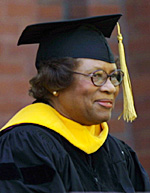 |
|
| Dr. M. Joycelyn Elders received the honorary Doctor of Science degree |
M. Joycelyn Elders
Dr. Joycelyn Elders—scientist, teacher, physician, public servant—has devoted her career to understanding and promoting the public’s health, preventing disease, and advocating for a just society in which good health is not the luxury of the wealthy or even the privilege of the gainfully employed, but the basic human right of all people.
Joycelyn Elders’ distinguished career has always been informed by her own humble beginnings as one of eight children of sharecroppers. Aided by her local community, she received a scholarship to attend Philander Smith College. She earned a medical degree at the University of Arkansas Medical School, where she later pursued fellowships in pediatrics and endocrinology. As a professor of pediatric endocrinology, she conducted research on a wide range of childhood health issues, including growth retardation diseases, diabetes, and sexual development and precocity in children. She is the recipient of numerous research grants from the National Institutes of Health, the National Science Foundation, and many other agencies and foundations, and is the author of over 175 articles in medical and scientific journals.
Dr. Elders entered public service in earnest when she became the director of public health for the State of Arkansas. She quickly emerged as a national leader among public health advocates, and was nominated by President Clinton in July 1993 to be Surgeon General of the United States. In her work in Arkansas and as Surgeon General, Dr. Elders took bold stands on such contentious issues as a national health plan, adolescent sexual activity, teen pregnancy, AIDS prevention, and health education.
For her contributions to our knowledge of diseases plaguing children, for her advocacy of outstanding health prevention and health care systems for all, for her belief in the power of education in promoting good health, and for her courageous convictions, I present M. Joycelyn Elders for the degree Doctor of Science.
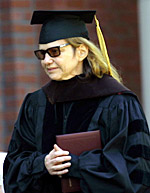 |
|
| Playwright and essayist Wendy Wasserstein received the honorary Doctor of Fine Arts degree |
Wendy Wasserstein
Artists make us see and understand ourselves. If their work makes us laugh in the process, so much the better. Today we honor a playwright and essayist whose work entertains and enriches us even as it challenges us to come to terms with who we are and how our contemporary culture works.
Wendy Wasserstein is a daughter of Brooklyn, and her plays are saturated with the rich broth of New York. As a child she was taken to the theater every weekend by her parents, and there began her love of the stage. After graduating from Mount Holyoke, she honed her playwriting skills at the Yale School of Drama. Uncommon Women and Others was her thesis project at Yale, and was her first play produced in New York. The Heidi Chronicles, Isn’t It Romantic, and The Sisters Rosensweig are among her Broadway credits. Her plays chronicle the lives, relationships, and values of contemporary Americans—especially women—as they navigate a society in which expectations are constantly changing. Funny, sad, trapped, free, her characters have a complexity that makes them deeply human.
Her plays have been celebrated by the critics in the choicest currency of the American stage: the Pulitzer Prize, the Tony Award, the Drama Desk Award, and the New York Drama Critics Circle Prize. Audiences connect with her characters, what they have to say, and how they find their way. For her uncanny ability to speak volumes about our time and place using irony as her foil, for her unpretentious and authentic humanity, for being a mentsh, I present Wendy Wasserstein for the degree Doctor of Fine Arts.
Keep Reading